Overview
In today's fast-paced software development landscape, developers often encounter significant coding challenges that hinder their productivity. How can these challenges be effectively addressed? Enter Kodezi, a platform designed to streamline coding processes and enhance collaboration. With features that automate repetitive tasks and provide real-time feedback, Kodezi empowers developers to focus on what truly matters—creating high-quality code.
By utilizing Kodezi, developers can experience improved productivity and code quality. Imagine reducing the time spent on debugging and refactoring, allowing for faster iterations and more efficient workflows. Furthermore, the platform fosters a collaborative environment, enabling teams to work together seamlessly, regardless of their geographical locations.
Are you ready to transform your coding practices? Explore the tools available on Kodezi and discover how they can help you overcome common development hurdles. With Kodezi, you can elevate your coding experience and achieve new levels of efficiency and quality in your projects.
Introduction
In an era where software development faces significant challenges regarding speed and precision, the integration of Artificial Intelligence (AI) into DevOps practices emerges as a transformative solution. This powerful combination streamlines workflows and enhances decision-making, enabling organizations to deliver high-quality software at unprecedented rates.
However, teams often encounter obstacles when implementing AI in DevOps. How can they navigate these complexities to unlock AI's full potential and revolutionize their development processes?
This guide outlines a step-by-step approach to harnessing AI in DevOps, paving the way for improved efficiency, quality, and continuous innovation.
Define AI and DevOps: Understanding the Core Concepts
Coding challenges are a common hurdle that developers face in today's fast-paced environment. Artificial Intelligence (AI) simulates human intelligence in machines, enabling them to think, learn, and perform tasks typically requiring human cognition. This encompasses technologies such as machine learning, natural language processing, and robotics. In this context, Kodezi emerges as a powerful ally, combining software development (Dev) and IT operations (Ops) to optimize the development lifecycle and ensure the efficient delivery of high-quality software.
Furthermore, the synergy between AI and development operations highlights how to implement AI in DevOps to enhance automation, predictive analytics, and decision-making processes. Kodezi addresses these challenges by showing how to implement AI in DevOps practices, enabling organizations to achieve greater efficiency in software creation and management. For instance, AI-driven tools within Kodezi can automate testing and deployment, predict potential issues before they arise, and facilitate continuous integration and delivery (CI/CD). This ultimately leads to faster release cycles and improved software quality.
As we approach 2025, trends indicate an increasing dependence on understanding how to implement AI in DevOps to enhance development and operations workflows. Companies are learning how to implement AI in DevOps to improve collaboration, automate routine tasks, and leverage data analytics for informed decision-making. This integration demonstrates how to implement AI in DevOps, boosting productivity and fostering innovation, thus positioning organizations to respond swiftly to market demands and technological advancements.
To experience the benefits of Kodezi CLI, consider starting with a 5-minute quickstart and view a demo that showcases how it autonomously improves code quality and fixes bugs before they reach production. Kodezi's automated code generation from PDF instructions using AI and its drag-and-drop functionality streamline the coding process. Additionally, KodeziChat provides rapid resolution for coding questions and issues. These innovations enhance collaboration and automation, supporting continuous integration and continuous delivery (CI/CD) practices, ultimately improving software delivery speed and quality.
Are you ready to elevate your coding experience? Explore the tools available on the Kodezi platform and discover how they can transform your development workflow.
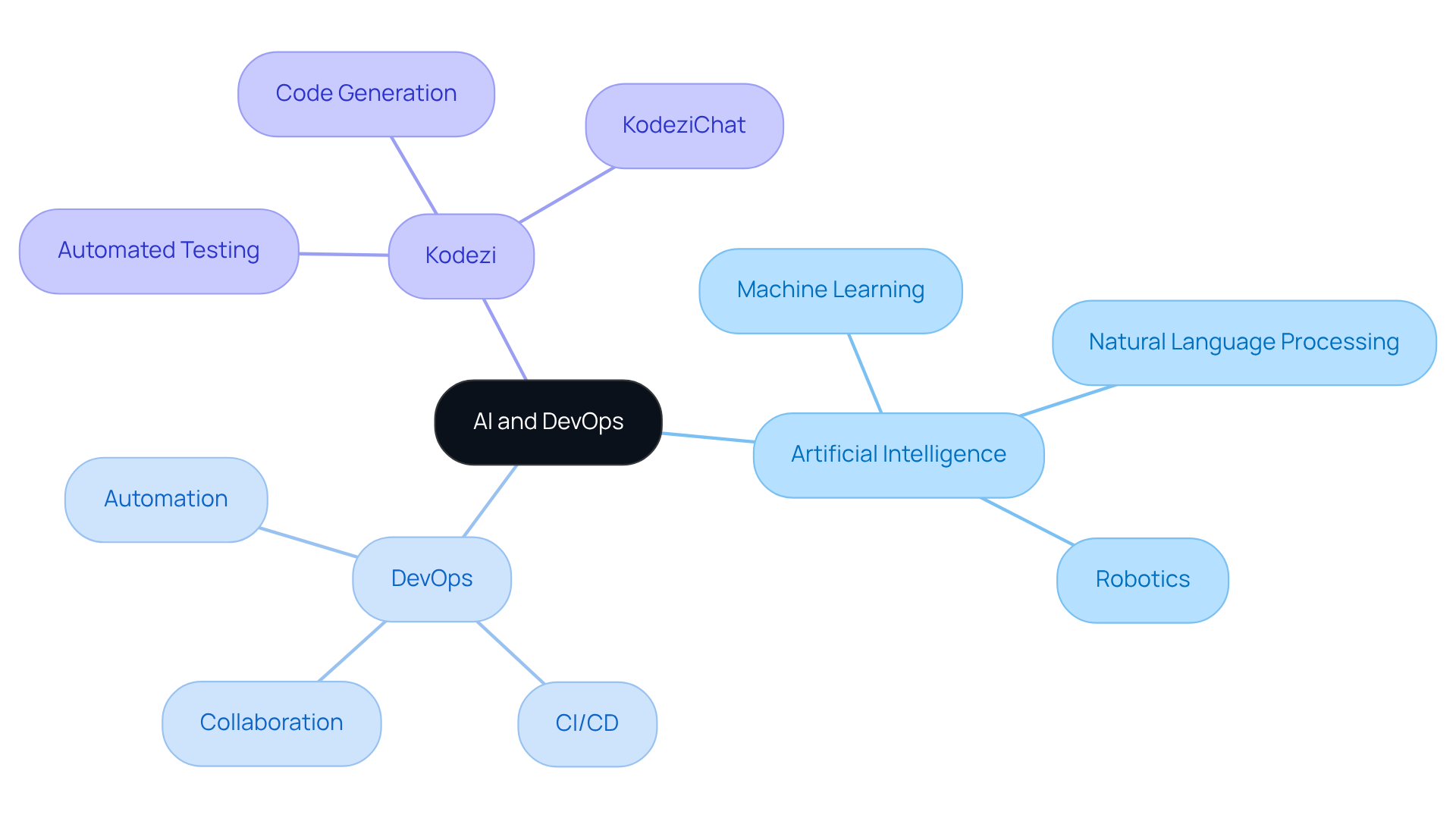
Identify the Benefits of AI in DevOps: Enhancing Efficiency and Quality
Developers often face significant challenges in managing their codebases and ensuring software quality. Understanding how to implement AI in DevOps can transform these challenges into opportunities for growth and efficiency. Kodezi addresses these issues head-on, offering a suite of features designed to streamline the development process.
-
Increased Efficiency: By automating repetitive tasks such as code reviews, testing, and deployment, AI allows teams to concentrate on higher-value activities. Kodezi CLI exemplifies this by autonomously improving codebases and fixing bugs before they reach production. This leads to significant improvements in developer productivity, enabling faster development cycles and more frequent releases. Over 1,000,000 satisfied users have already transformed their debugging processes with Kodezi.
-
Enhanced Quality: How can we ensure that our software is both robust and secure? AI tools meticulously analyze code for vulnerabilities and performance issues, ensuring that software is ready for deployment. Organizations exploring how to implement AI in DevOps, including those using Kodezi, have noted improvements in software quality metrics, with 61% reporting enhanced deliverable quality due to AI's role in the process. Users have praised Kodezi for its ability to help them find and fix bugs faster and easier than manual methods, making it a lifesaver in maintaining code quality.
-
Predictive Analytics: Imagine being able to anticipate problems before they arise. AI's capability to foresee potential issues based on past information enables teams to implement proactive measures, greatly decreasing the chances of defects. Kodezi's features allow QA teams to focus on the most problematic areas, optimizing resource allocation and improving overall project management. This predictive capability is further enhanced by Kodezi's ability to prioritize test cases based on potential risks and historical data.
-
Faster Incident Response: What if you could resolve issues before they impact your users? AI-driven monitoring tools swiftly identify and resolve issues, minimizing downtime and enhancing user satisfaction. In fact, 35% of organizations have experienced faster resolution times for security incidents due to AI integration. Kodezi users have noted that its debugging capabilities feel like unlocking a new superpower, allowing for quicker resolutions and improved productivity.
These benefits collectively foster a more agile and responsive development environment. With Kodezi, teams can effectively manage growing codebases and technical debt. Explore the tools available on the platform to enhance your development process today.
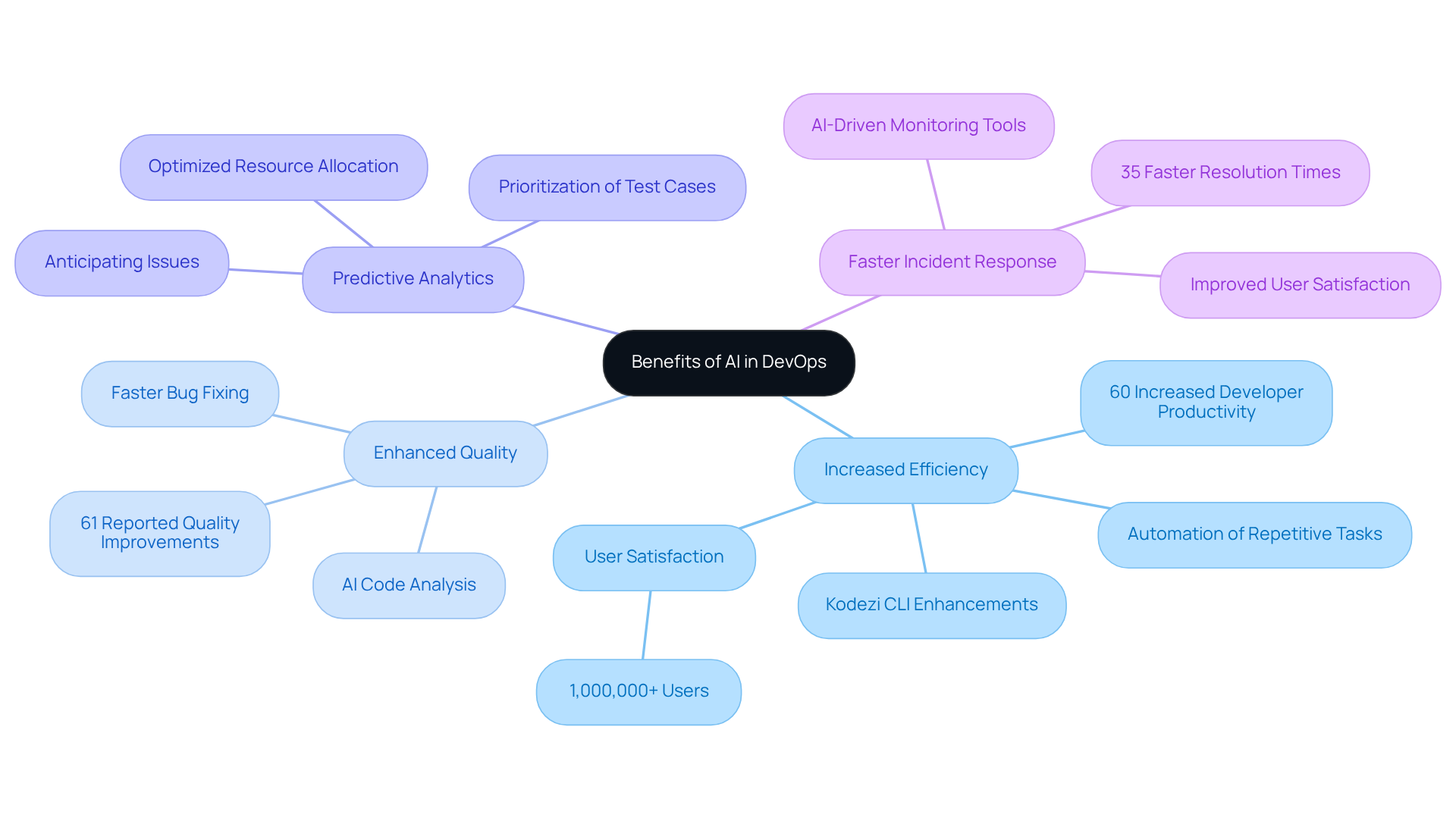
Outline a Step-by-Step Implementation Process for AI in DevOps
To effectively implement AI in DevOps, it is essential to understand how to implement AI in DevOps while addressing the coding challenges developers face. Consider the following structured approach:
-
Assess Current Processes: Begin by evaluating existing development operations workflows to pinpoint areas where AI can enhance efficiency and effectiveness. This assessment should focus on identifying bottlenecks and repetitive tasks that AI could automate.
-
Define Objectives: Establish clear, measurable goals for AI integration. Objectives might include reducing deployment times, enhancing code quality, or improving incident response rates. Setting specific targets will guide your implementation strategy.
-
Select Suitable Resources: Choose AI resources that seamlessly integrate with your current DevOps stack. Seek solutions like AI-driven testing frameworks or monitoring systems that can improve your current processes without causing disruption.
-
Pilot Implementation: Launch a small-scale pilot project to evaluate the chosen AI resources. This enables your team to collect feedback and evaluate the resources' effectiveness in practical situations, reducing risks linked to complete implementation.
-
Evaluate and Iterate: After the pilot, analyze the results to determine the effect of the AI resources. Use this data to make necessary adjustments and refine your approach before scaling the implementation across the organization.
-
Train Your Group: Provide comprehensive training for members on how to effectively utilize AI tools and interpret their outputs. This training is crucial for maximizing the benefits of AI and ensuring that your team is equipped to leverage these technologies effectively.
By following these steps, organizations can discover how to implement AI in DevOps to enhance their development and operations processes, leading to improved productivity and faster delivery cycles. How can you leverage AI in your DevOps practices to achieve similar results?
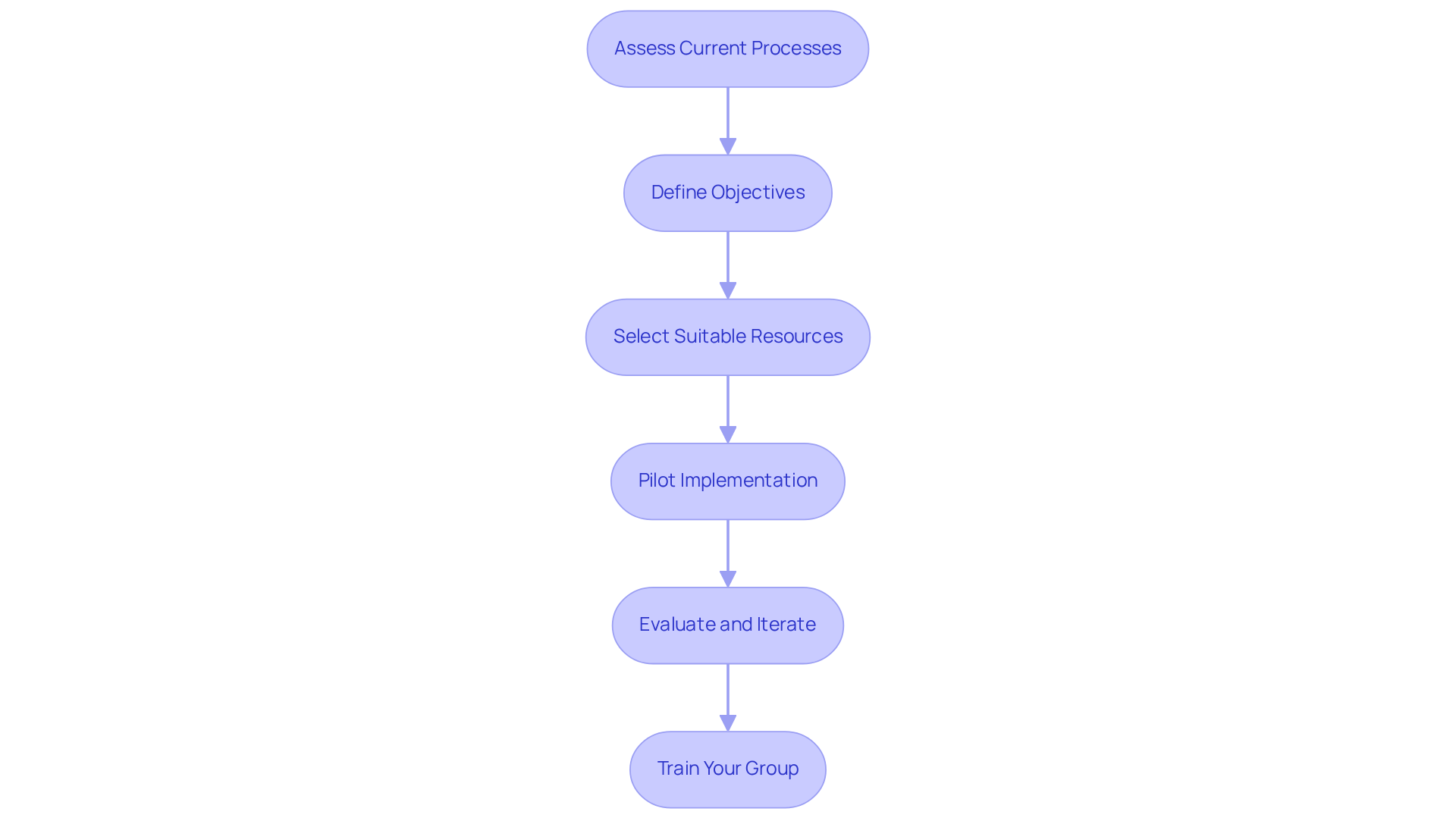
Address Challenges and Considerations: Navigating the Implementation Landscape
Organizations must effectively navigate the challenges of how to implement AI in DevOps. High-quality data is essential for AI systems to deliver accurate predictions. Organizations frequently encounter substantial financial losses—averaging $406 million each year—due to underperforming AI models constructed on flawed information. Ensuring that your information is clean, relevant, and well-structured is essential to avoid these pitfalls.
Furthermore, understanding how to implement AI in DevOps is crucial, but it can be intricate. Numerous organizations face challenges regarding information accessibility, with 69% indicating troubles in retrieving essential information for AI programs. Planning for potential disruptions and allocating resources for a seamless transition is crucial to mitigate these challenges.
In addition, teams may need additional training to leverage AI tools effectively. Over half of senior decision-makers identify a lack of skilled personnel focusing on AI as a top barrier to effective model building. Analytics specialists presently dedicate roughly 67% of their time organizing information rather than enhancing AI models, emphasizing the necessity for upskilling to optimize AI advantages. Investing in workforce development is essential for successful AI integration.
Similarly, resistance to change can significantly hinder AI adoption. A culture that embraces innovation and encourages experimentation with AI technologies is vital. Organizations that promote transparency and share data quality metrics can foster a supportive environment for AI initiatives, ultimately enhancing their operational capabilities.
By addressing these considerations, organizations can better position themselves to learn how to implement AI in DevOps, thereby harnessing the transformative potential of AI in their development and operations practices.
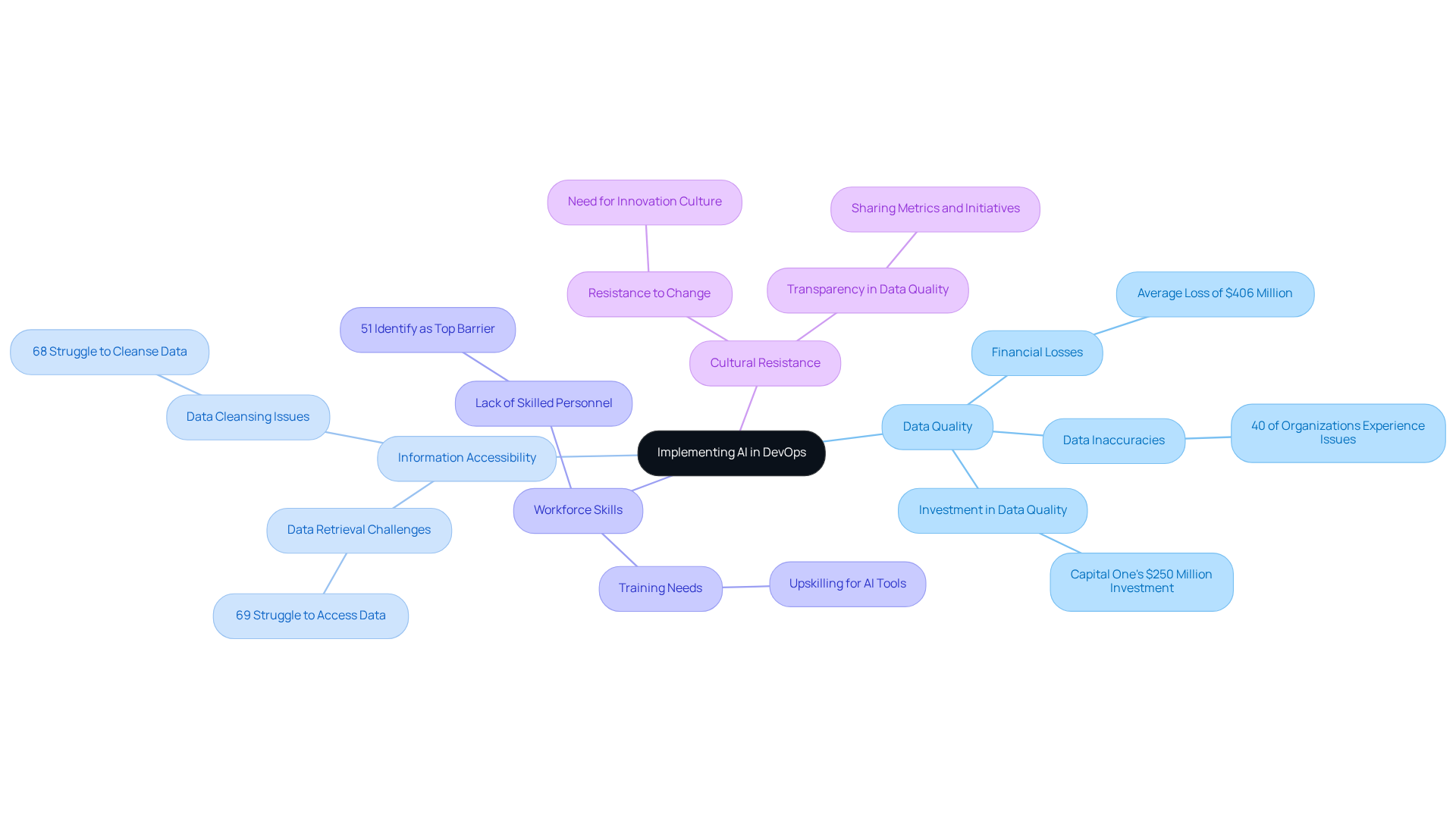
Establish Continuous Improvement Practices: Ensuring Long-Term Success
To ensure long-term success with AI in DevOps, understanding how to implement AI in DevOps through continuous improvement practices is essential. Regularly reviewing performance metrics is a fundamental step. Consistently analyzing key performance indicators (KPIs) allows teams to evaluate how to implement AI in DevOps processes. High-achieving groups, for instance, can implement changes several times a day, sustaining change failure rates between 0-15%. This underscores the effectiveness of strong metrics in enhancing performance. Furthermore, these groups typically recover from system failures in under an hour, highlighting the significance of tracking metrics such as Mean Time to Recovery (MTTR) and Lead Time (LT) for ongoing enhancement.
In addition, soliciting feedback fosters an environment of open communication. Encouraging team members to share their opinions on AI resources and their effectiveness not only enhances tool adoption but also drives innovation and improvement. How often do you seek input from your team?
Moreover, it is crucial to learn how to implement AI in DevOps to adapt and evolve with advancements in AI technologies. Organizations willing to adjust their strategies accordingly can significantly reduce downtime and accelerate innovation. As noted by Tom Hall, high-performing groups recover swiftly from failures, emphasizing the necessity for agility in responding to new challenges.
Finally, documenting learnings is vital for sustained progress. Maintaining comprehensive documentation of processes, challenges, and successes is essential for guiding future AI initiatives and facilitates knowledge sharing across the organization, particularly in understanding how to implement AI in DevOps. This ensures that lessons learned contribute to ongoing improvement efforts. By monitoring trends over time, groups can recognize patterns that inform better decision-making and enhance overall performance. For instance, referencing case studies on deployment frequency illustrates the differences in capabilities between high-performing and lower-performing teams, reinforcing the importance of these practices.
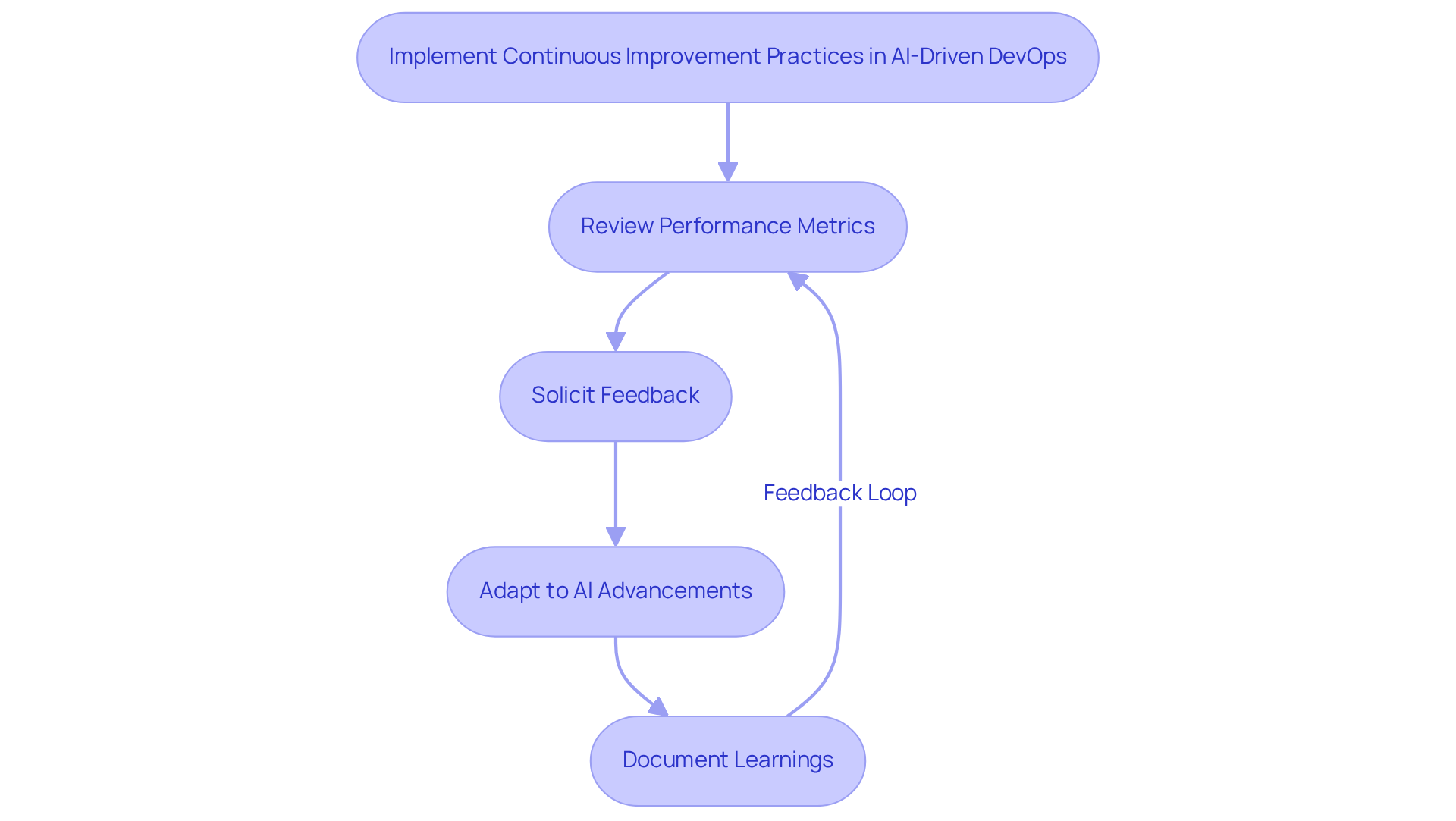
Conclusion
The integration of Artificial Intelligence (AI) into DevOps practices represents a significant shift that enhances efficiency, quality, and overall productivity in software development. By grasping the core concepts of AI and DevOps, organizations can leverage AI tools effectively to streamline workflows, automate repetitive tasks, and foster a culture of continuous improvement. This guide illustrates a clear pathway for organizations aiming to implement AI successfully, ensuring they are equipped to navigate the complexities of this integration.
Key insights highlight the numerous benefits of AI in DevOps, including:
- Increased efficiency through automation
- Enhanced software quality via predictive analytics
- Faster incident response times
It is crucial to address challenges such as:
- Data quality
- Team training
- Resistance to change
Organizations prioritizing these aspects are more likely to reap the rewards of AI integration, ultimately leading to improved software delivery and customer satisfaction.
The journey of implementing AI in DevOps is a transformative process that requires careful planning, execution, and a commitment to continuous improvement. As the landscape of software development evolves, embracing AI technologies is essential for organizations aiming to remain competitive and responsive to market demands. By proactively integrating AI into their DevOps practices, teams can unlock new levels of efficiency and innovation, paving the way for a future where high-quality software delivery becomes the norm.
Frequently Asked Questions
What is AI and how does it relate to DevOps?
Artificial Intelligence (AI) simulates human intelligence in machines, enabling them to think, learn, and perform tasks typically requiring human cognition. In the context of DevOps, AI enhances automation, predictive analytics, and decision-making processes, leading to more efficient software development and operations.
What role does Kodezi play in AI and DevOps?
Kodezi combines software development (Dev) and IT operations (Ops) to optimize the development lifecycle. It implements AI in DevOps practices, automating tasks like testing and deployment, predicting potential issues, and facilitating continuous integration and delivery (CI/CD), ultimately improving software quality and release cycles.
How does AI improve efficiency in DevOps?
AI improves efficiency by automating repetitive tasks such as code reviews, testing, and deployment, allowing teams to focus on higher-value activities. Kodezi CLI exemplifies this by autonomously enhancing codebases and fixing bugs before they reach production, leading to faster development cycles and more frequent releases.
In what ways does AI enhance software quality?
AI tools analyze code for vulnerabilities and performance issues, ensuring software readiness for deployment. Organizations using AI in DevOps have reported improvements in software quality metrics, with many noting that AI helps them find and fix bugs faster than manual methods.
What is predictive analytics in the context of AI and DevOps?
Predictive analytics in AI allows teams to anticipate potential issues based on historical data, enabling proactive measures to reduce defects. Kodezi enhances this capability by prioritizing test cases based on risks and past information, optimizing resource allocation for project management.
How does AI contribute to faster incident response?
AI-driven monitoring tools quickly identify and resolve issues, minimizing downtime and enhancing user satisfaction. Organizations using AI have experienced faster resolution times for security incidents, allowing teams to address problems before they impact users.
What are the overall benefits of integrating AI in DevOps?
Integrating AI in DevOps fosters a more agile and responsive development environment by increasing efficiency, enhancing software quality, enabling predictive analytics, and improving incident response times, all of which help teams manage growing codebases and technical debt effectively.




